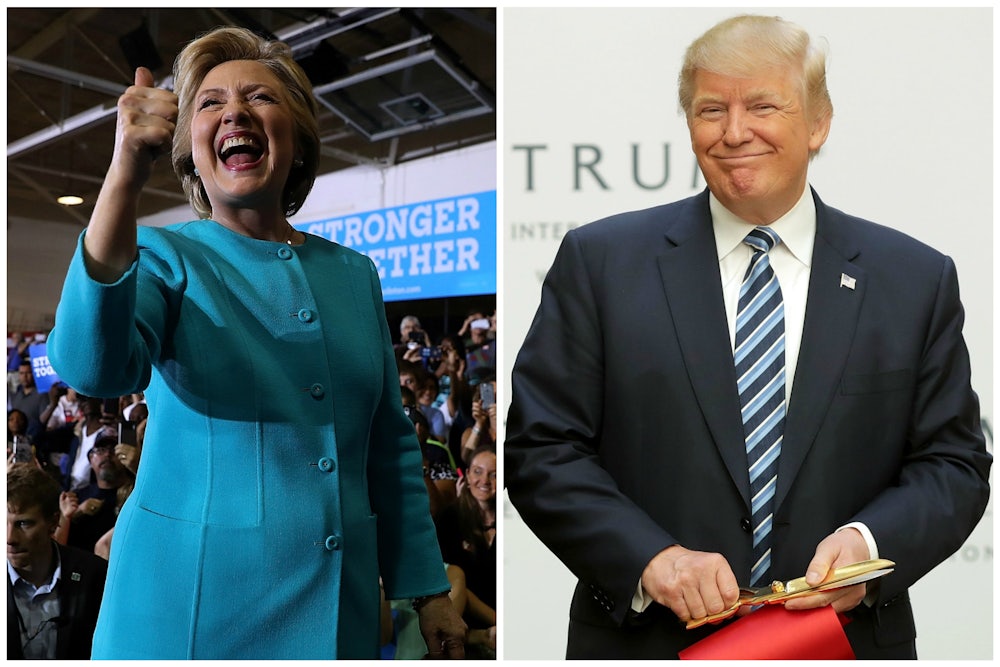With less than two weeks to the election, Hillary Clinton campaigned Wednesday in Florida, a key swing state where the race couldn’t be tighter. (She’s two points behind in the latest poll, but narrowly ahead in the aggregate.) Donald Trump spent the morning and early afternoon in Washington, D.C., a city that’s 76 percent Democratic and has just three electoral votes, to cut the ribbon on his new luxury hotel. He was headed to rallies in battleground North Carolina later in the day, but that state is the least of his worries given his formidable path to the presidency.
Their schedules say it all: Clinton is still fighting, and Trump is folding.
Trump talks a good game about fighting—always has. “I always loved to fight,” he told journalist Michael D’Antonio in 2014, in tapes leaked recently to The New York Times. “Any kind of fight, I loved it, including physical.” After Vice President Joe Biden said he’d like to beat Trump up last week, the Republican nominee responded in kind. Their only disagreement seemed to be where this tussle of titans would take place—behind a high school gym or in the back of a barn.
Yet when it comes to Trump’s campaign—his great quest to be the voice of the forgotten white working class, and to “Make America Great Again”—he is giving up and looking ahead to his post-election life, one that won’t require moving to the nation’s capital.
We saw this coming. In a profile in The New Yorker this month, Trump campaign manager Kellyanne Conway told Ryan Lizza she scolded her boss for saying that if he lost, he’d “go back to a very good life” and take “a very, very nice, long vacation.” She explained to Trump that it wasn’t acceptable to say, “Eh, if it doesn’t work out, I’ll go back to the happy place,” given that millions of people were invested in his campaign.
But Trump is already retreating to his happy place. In unveiling his hotel—housed in the Old Post Office on Pennsylvania Avenue between the Capitol and the White House—he got to celebrate a successfully completed project while surrounded by family and staff. “We’ve built one of the great real estate companies of the world,” he boasted.
Trump did attempt to tie the event to his presidential bid, saying the hotel’s construction came in “under budget and ahead of schedule,” making it “a metaphor for what we can accomplish for this country.” But most of the media didn’t buy the salesman’s pitch. Even cable television, which has all too often acquiesced to Trump, largely ignored the spectacle.
“Donald Trump has less than two weeks left in his presidential campaign, but his closing argument sounds as much about his business interests as his electoral ones,” Politico observed, noting that Trump on Tuesday visited one of his golf resorts in Florida (when he should have been courting voters). “[N]ever before has a presidential campaign looked so much like an infomercial.”
Explaining that Trump has now made a habit of “dragging reporters to his marquee properties in between his campaign events,” the Times called the trend “a remarkable display of personal promotion by a presidential nominee, raising questions about whether the businessman, who has lived by the mantra that ‘all publicity is good publicity,’ is at least partly casting his eye past the 2016 race, and toward bolstering the brand that bears his name.”
Hillary Clinton is not looking past this race. She’s focused on closing strong—and she wants voters to know it. “It’s going to be a close election,” she said in Coconut Creek, Florida, on Tuesday. “Don’t get complacent, because we’ve got to turn people out.”
Clinton’s right to take nothing for granted, of course, but there’s evidence her tireless fighting is finally paying off. New Harvard polling shows her outpacing President Barack Obama’s 2012 margin with millennials, the group she famously lost to Bernie Sanders in this year’s Democratic primary. Time magazine partly attributes the surge in support to Clinton’s three masterful debate performances, impressing millennials with her “methodical takedowns” of Trump.
“They’re attracted to her toughness,” Sam Frizell wrote, “and amid the campaign kitsch and carefully tested messaging, they say they are for the first time detecting a glimmer of authenticity in her fighting style.”
The debates, incidentally, were also where Trump was prompted to say the nicest thing he’s said about Clinton in this entire campaign. “She’s a fighter,” he conceded. “I disagree with much of what she’s fighting for. I disagree with her judgment in many cases. But she does fight hard, and she doesn’t quit and she doesn’t give up and I consider that to be a very good trait.”
This is a very good trait—for a candidate and for a president—and it’s not one Trump possesses in this campaign. His heart doesn’t seem in it, and he was always more interested in bolstering his brand and embarrassing his enemies than in serving his country. Now, on the ropes against a political heavyweight, Trump is abandoning the fight. He’s got a very nice, long vacation to plan.
